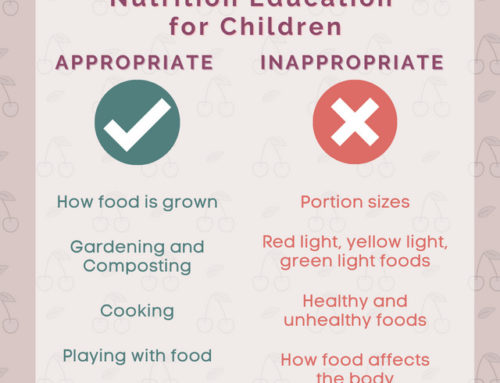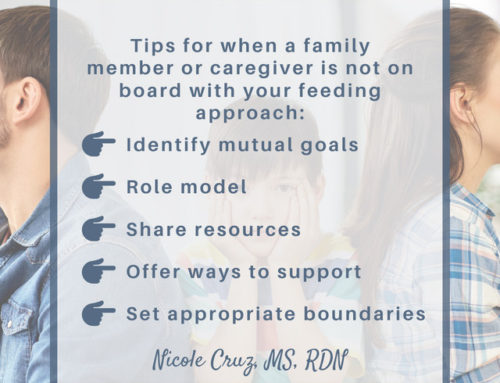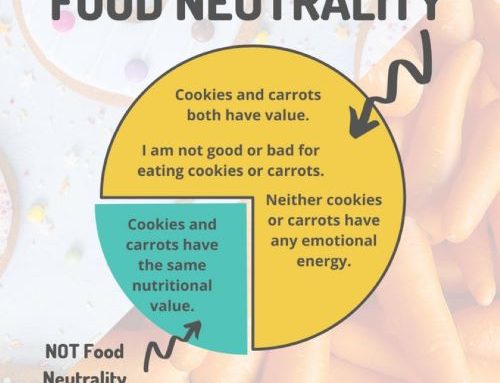Do you ever feel like you’re in the kitchen non-stop getting snacks or that you’re standing up getting more food at a meal than actually sitting and eating?
Well, me too! I think it’s pretty normal, and I’m going to offer some tips about how to make it a bit less common.
The other day for breakfast, I made eggs, sausage, english muffins, and fruit. I made what I thought was enough for everyone, with the likelihood that we would even have some left like we often do.
My two-year-old daughter had one serving of eggs and then asked for another. After her and everyone had eaten their share, the eggs were gone, and she wanted more.
I got up and scrambled her another egg. She ate that one… and then one more –> Four eggs and fruit. She’s two!
Sometimes my seven-year-old seems like he’s never going to stop eating. He will eat more than myself and my husband combined.
Other times my children might not touch a bite of their meal or snack.
All of this is normal. Hunger is variable.
At times it may seem like your kiddo is ALWAYS hungry or won’t stop eating.

Children have higher caloric needs than adults per pound of body weight because they’re growing at a greater rate. That doesn’t mean that they necessarily need more total energy than us, but sometimes they do. Their needs also vary based on activity level, body size, appetite, rate of growth (growth spurts), and previous intake.
Just because your child is always hungry, does not mean that something is wrong with them.
You might have some underlying concerns about their actual hunger, and I’ll address those too in a second.
Hunger is normal and we need to trust our children, AND it can be exhausting to keep up with as parents.
So, here are some practical tips:
Make an ample amount of food and plan for leftovers from the start. Put out plenty of food so you don’t constantly have to be back and forth to the kitchen or getting up and down.
Provide a variety of food at meals and snacks. Be sure to include at least one source of protein and/or fat. Do not force them to eat any specific foods, but protein and fat do provide more substance and staying power.
Respond to their needs. In following the Division of Responsibility you are in charge of the what, when, and where. They are in charge of how much to eat, if anything.
- Offer snacks more often. If you want to maintain very structured snack times, you will need to offer snacks more frequently.
- Have flexible snack times. Put out a tray of food and allow them to come eat for a period of time and then clean it up about an hour before a meal.
- Provide a snack drawer or cupboard. Allow them to help themselves to snacks, and then let them know it’s “closed” about an hour before a meal. Just be sure to change out the foods available and not only offer “healthy” snacks. (This elevates some foods and makes others seem more special or off limits.)
For more on this flexibility and structure within an intuitive eating framework, check out It’s Not a Free for All.
Foster trust in them to eat as much as they need. As parents, our job is to provide the food and their job is to eat as much or as little as they need. We need to trust them, not comment on their food intake nor act like something is wrong with them.
Hunger is normal. It’s important we don’t pathologize it.
Hunger is is variable. It’s not always regular nor predictable.
I know you may have some concerns about your child and question if they are eating based on hunger or for other reasons.
Sometimes we do eat more because something tastes good even though we’re not hungry, and that’s normal. That usually balances itself out and we eat less at the next meal or the next day. However, sometimes that does become the norm and we consistently eat for reasons other than hunger.
If you are concerned your child is regularly eating due to boredom, anxiety, or emotional distress, it’s important to look at those underlying issues and not treat the actual behavior itself.
If you are concerned about these issues, I encourage you to get support from a child therapist who can help you sort through the underlying concerns.
Another cause of non-hunger eating is reactive eating. Your child may be eating in excess as a reaction to prior or current restriction. If you have previously limited portions or types of foods, they will try to eat as much as possible when the food is available or ask for it regularly, like an obsession.
If you are new to the Division of Responsibility, it will take time for the “overeating” behaviors to subside.
I know it can be distressing to watch your child continually eat or to feel concerned about the amount they eat. Much of these fears are born out of our dieting culture that is scared of large bodies and eating in general.
I know it can be hard to let go and trust your child to eat the amount they want, but we don’t always know their hunger levels nor what they need. (You can read more about how the Division of Responsibility works in trusting our kiddos HERE!)
Even though this is challenging, know that restricting their intake (in type of food or portions) will most likely lead to reactive eating and a disordered relationship with food.
Try to stay the course and trust your child and the process.
Thank you for joining me and letting me be a part of your journey in creating joyful eating for your family. I look forward to connecting with you soon!








Leave A Comment